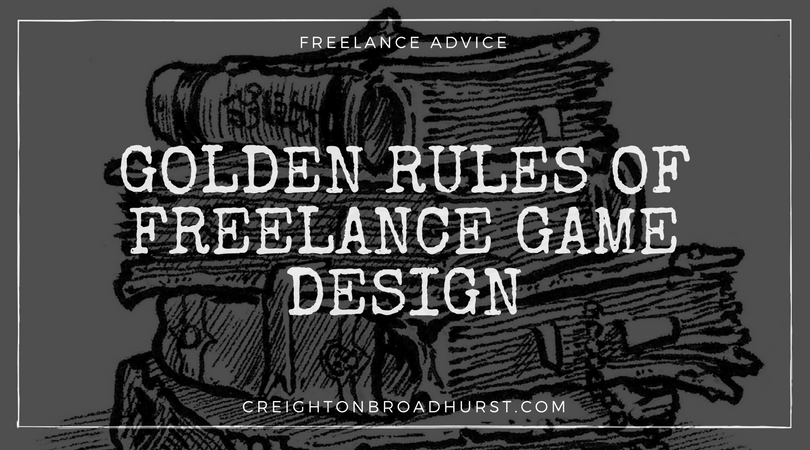Freelancing is tough. Long hours, bad pay and design angst are the lot of a freelancer’s life. Finishing one job is hard enough, but landing a follow-up contract requires more than just compelling content…
There is a lot more to freelancing than just creating material. When designing a project, never lose sight of the fact that publishers work with freelancers with whom they like working. If you make their job easy, by following the golden rules below and designing great content, you’ll get repeat work.
- Get A Contract: Don’t work without a contract and don’t work for free. Value your work (but don’t expect a gigantic pay check).
- Hit Deadline: Hitting your deadline is crucial. Your publisher will be ordering artwork and commissioning an editor to polish and develop your work. He will also have inserted your product into his release schedule. Missing deadline means the publisher faces a stark choice: push back the release date or rush the development of the product. Neither is ideal.
- Hit Word Count: You’ve been contracted to provide a certain amount of words. Hit that target. You don’t have to hit it exactly, but you should aim to be as close as possible. A good benchmark is +/- 10%
- Follow Guidelines: The publisher has provided you with a design brief. He’s probably also provided a style sheet and possibly even his general design principles. Follow these religiously. If you don’t, your work may be rejected as unsuitable or you could create a lot of needless work for the editor. Either way this could delay the project or add to its costs. Neither scenario is likely to endear you to the publisher.
- Keep in Contact: Publishers like contactable freelancers that are responsive to questions. Silent freelancers can make publishers very nervous – particularly if they have not worked with you before. Check your email once a day and reply to you publisher’s emails within a day.
- Accept Your Work WILL Be Edited: Your work is not perfect. You made mistakes. Some freelancers assume their text is perfect. They argue over even the smallest change and scream blue murder if the foolish publisher asks for changes or revisions. This kind of freelancer is hell to work with. Don’t be this guy. Rather accept that your work will be edited or that you may be asked to revise portions of the text.
- Know the Game: If you are writing for a particular game system you need to be conversant with its mechanics. No turnover is mechanically perfect, but you should strive to follow the rules as written as much as is possible. If you need to include house rules and such like discuss these with the publisher before you add them into your project – particularly if they are in some way pivotal to the finished product.
- Know the Publisher: Be familiar with the company’s other products – particularly if your project is part of a product line. Some publishers are happy to provide PDFs of previous entries in the line, others expect you to already have copies.
- Play the Game: Play the game for which you are writing. If you don’t, your work will suffer. It’s that simple.
- Accept and Value Feedback: Face it – you are not the best designer in the world and not everyone is going to love what you write. If your publisher gives you feedback, embrace it. The fact that he is bothering to provide feedback means he thinks it is a worthwhile use of his time. He is probably planning to work with you again – otherwise why would he bother? If a customer posts a review with constructive criticism read and ponder the suggestions. You don’t have to agree with the comments, but you should consider them – after all, the reviewer might have a point (and I assume you want to improve your design standard).
- Edit: Ruthlessly edit your work. Expunge as many typos, grammatical errors, extraneous words and so on as possible. This makes you look professional and results in a tighter, polished turnover.
- Write: Even if you are not on a job, practise writing and designing. Designing is like any other skill – the more you do it, the better you get.
Following the rules above will make you beloved of publishers and editors the world over. Of course, you still have to provide compelling, exciting material but these golden rules of freelancing vastly improves your chances of success.
Help Fellow Freelancers!
Do you have any suggestions for golden freelancing rules I’ve missed? Let us know in the comments below and help freelancers everywhere.


This article is one of the first places I point to when we get new members over at Freelance Forge. Just thought I’d let you know how much we value your advice!
Thanks for the mind words , Mike! I’m delighted you’ve found it so useful!
Thank you for the priceless information & advice! I am going to be doing some freelancing work & would love to create content for Starfinder as well as Pathfinder.
My pleasure. Good luck with the freelancing career. I hope you enjoy yourself and get to write the kind of stuff you really want to write!